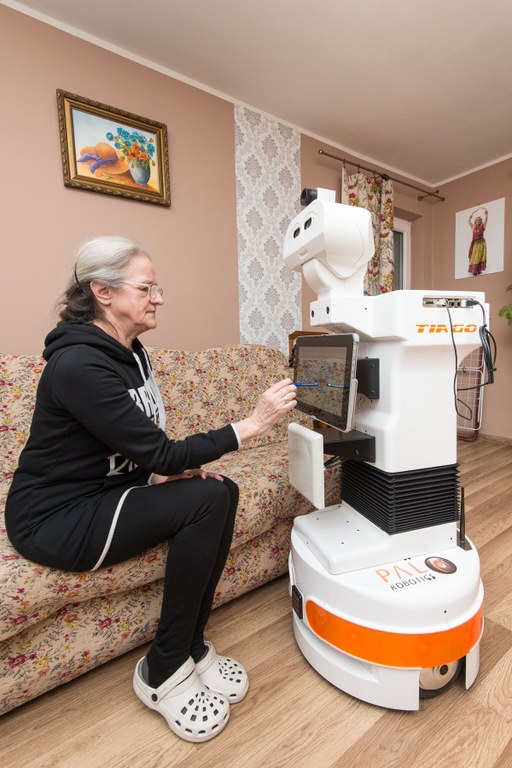Robots for Assisted Living - IROS'2018 Workshop
Objectives
With the increase in life expectancy and the shortage of caregivers in developed countries, robotic assistive technologies are getting rising attention in many different contexts worldwide.
This workshop aims at bringing together persons working in the field of assistive robotics for healthcare and daily living, with the goal of discussing ongoing challenges, research directions, requirements and applications in this rapidly growing field. Robotics for assisted living spans a wide range of robotics expertise, including (physical) human-robot interaction, safety, verbal and nonverbal communication, interfaces, adaptive and compliant control, learning and adaptation for personalized assistance, analysis and recognition of daily living activities.
A tight integration of these diverse components is required to build adaptive and personalized assistive systems. This workshop aims at providing an overview of the current state of the art, discuss the available technologies and frameworks that can help at integrating these different components, the potential barriers (both at technical and technology transfer levels), and the next challenges that we need to tackle to bring robots into different healthcare and assisted living scenarios.
Topics of interest
- Robotic aids for activities of daily living and healthcare
- Care assistance with robots
- Personalized robotic assistance
- Safety in HRI context
- Multimodal human-robot interfaces for assistive robotics
- Verbal and nonverbal interaction strategies
- Adaptive and compliant control methodologies
- Physical Human-robot interaction
- Learning from demonstration
- Rehabilitation robotics
- Wearable robots: Exoskeletons, actuated orthoses and prostheses
- Cloth manipulation and dressing assistance
Intended audience
Robot industries, healthcare institutions, technological centers, research programs, professional associations, political forums, and the society at large are nowadays aware of the importance of developing assistive robotics technologies. Thus, this workshop is expected to be attractive to a high fraction of the robotics community attending IROS.
Robots for assisted living require advancements in many areas: physical and social human-robot interaction, safety procedures, adaptive and compliant control, personalization, user modeling, motion learning strategies, multimodal interfaces, as well as robot design for specific cognitive or physical disabilities. The target audience is mainly researchers on all the above topics, as well as representatives from robotics companies, officers from funding agencies, and other attendants wanting to get an overview of the state-of-the-art and the pending research challenges in this rapidly growing field.
Call for contributions
Participants are invited to submit extended abstracts (2-4 pages) of work relevant to the Robots for Assisted Living workshop, following the IEEE conference template (Latex). Publications to be presented at the main conference are also welcome. The accepted contributions will be posted on the workshop website.
Please submit your contributions before July 6, 2018 August 5, 2018, via email to robforal.workshop@gmail.com.
Accepted contributions will be presented as short oral presentation and poster contribution. It is expected that presentation will be short (~3mins) to give opportunity for all presenters to highlight the key findings of their research and identify their poster to the audience. Furthermore, we plan to invite a selected number of papers from all extended abstracts to submit their work to a special issue journal (to be defined). This special issue will cover the main topics of interest of this workshop.
The list of accepted contributions is available here.
Location and date
The Workshop id is FrA18 and will take place in Room 2.L3, on October 5, 2018.
The complete program is available here.
Invited Speakers
Prof. Tomohiro Shibata
Graduate School of Life Science and Systems Engineering
Human and Social Intelligence Systems Lab
Kyushu Institute of Technology
Kitakyushu, Japan
Prof. Yiannis Demiris
Human-Centred Robotics Lab
Faculty of Engineering
Department of Electrical and Electronic Engineering
Imperial College London, UK
Prof. Manuela M. Veloso
Herbert A. Simon University Professor
Head, Machine Learning Department
School of Computer Science
Carnegie-Mellon University
Pittsburgh PA, USA
Title of talk: Explainable AI Assistance
Prof. Charlie Kemp
Associate Professor, Department of Biomedical Engineering
Adjunct in the School of Interactive Computing
Adjunct in the School of Electrical and Computer Engineering
Georgia Institute of Technology, USA
Prof. Vaclav Hlavac
Czech Technical University in Prague (CTU)
Czech Institute of Informatics, Robotics and Cybernetics (CIIRC)
Prague, Czech Republic
Title of talk: Two use-cases: dual-arm manipulation with clothes and other soft objects; use of a force compliant manipulator in robotic rehabilitation
The talk will report about two use-cases developed at the Czech Technical University in Prague, which are potentially useful for robots assisted living. The first use-case follows on results from EC projects CloPeMa (Cloth Perception and Manipulation) and RadioRoSo (Radioactive Waste Robotic Sorting). I will describe the methodology an, results. The second use-case, our application of a general purpose force-compliant manipulator KUKA LBR iiwa in robotic rehabilitation. It is an outcome of a diploma project. I will show how the manipulator can be explored for the muscle test, which a physioterapeutist makes subjectively at the beginning of each session. Our implementation is for the biceps muscle test. Both use-cases open many other possibilities in robot assisted living. I will speculate about this outreach too.
Dr Jordi Pages (PAL Robotics)
Title of talk: PAL Robotics experience in Assisted Living projects
Since 2015, PAL Robotics has participated in diverse European projects that focus on preparing robots for supporting the elderly at home and improve their quality of life. Projects like GrowMeUp, Socrates, SACRO, and EnrichMe, as well as our commitment with the European Robotics League (Service Robotics category), made us better understand the needs of Assisted Living and the tasks in which robots like TIAGo can be more helpful for old or impaired people. At this invited talk, we will give insights of our experience in the customization and validation of the robot, the integration and the support during the pilots' set up. Some conclusions of the projects after the pilots are significantly relevant to understand why robots stand as a key solution for improving people's quality of life and can be a solution when we face the challenge of the aging population.
Organizing Committee
Dr Sylvain Calinon, Idiap research Institute
Prof. Sanja Dogramadzi, University of the West of England
Prof. Carme Torras, Institut de Robòtica i Informàtica Industrial, CSIC-UPC
Dr Guillem Alenyà, Institut de Robòtica i Informàtica Industrial, CSIC-UPC
Prof. Tomohiro Shibata, Kyushu Institute of Technology
Prof. Yiannis Demiris, Imperial College London
Support
The workshop is supported by the IEEE-RAS Technical Committee on Rehabilitation and Assistive Robotics, by the I-DRESS Project (CHIST-ERA project supported by Ministerio de Economía y Competitividad (Spain), by the Engineering and Physical Sciences Research Council (UK), and by the Swiss National Science Foundation), by the PAL Project and by the HAFY Project.





